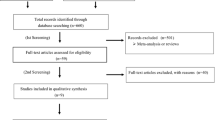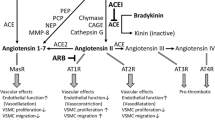Abstract.
Aspirin and angiotensin-converting enzyme inhibitors (ACEIs) are often associated for the treatment of coronary disease and/or chronic heart failure, but conclusions of some prospective and retrospective studies show a possible negative interaction between aspirin and ACEIs. ACEIs inhibit the conversion of angiotensin I to angiotensin II and also the catabolism of bradykinin, which results in increased synthesis of vasodilatory agents [prostaglandins and nitric oxide (NO)], whereas aspirin inhibits prostaglandin synthesis. Thus, a potential interaction from the opposing effects of aspirin and ACEIs could affect the metabolism of bradykinin. We conducted an extensive Medline search, as well as a manual search, of published literature including pharmacodynamic studies and clinical trials concerning the impact of aspirin on the effect of ACEIs in hypertension, coronary disease and chronic heart failure. A review of this literature shows five studies in hypertension (all prospective and using blood pressure as the main criterion of assessment), five in coronary disease (three retrospective and two prospective trials, four of which use mortality as the criterion of assessment) and 13 in chronic heart failure (eight using haemodynamic measurements of which seven are prospective – one prospective study using pulmonary tests, four using clinical events including mortality as criterion of assessment of which two are prospective). The counteraction of ACEI efficacy by aspirin is demonstrated in one out of five studies in hypertension, one out of four of studies in coronary disease and nine out of thirteen in chronic heart failure. This counteraction is more often observed with high dosages of aspirin (greater than 250 mg/day, four out of six studies) and less often with lower dosages (less than or equal to 250 mg/day, three out of 11 studies). These studies are retrospective analyses or use haemodynamic end-points, so there is as yet no methodological argument strong enough to contraindicate the aspirin–ACEI association or to prove the clinical relevance of this interaction. In conclusion, prospective studies using mortality as a criterion of assessment are needed to offer the practitioner the answer to the question of ACEI–aspirin association.
Similar content being viewed by others
Author information
Authors and Affiliations
Additional information
Accepted in revised form: 28 August 2000
Electronic Publication
Rights and permissions
About this article
Cite this article
Meune, C., Mahe, I., Mourad, J. et al. Interaction between angiotensin-converting enzyme inhibitors and aspirin: a review. Eur J Clin Pharmacol 56, 609–620 (2000). https://doi.org/10.1007/s002280000210
Received:
Published:
Issue Date:
DOI: https://doi.org/10.1007/s002280000210




